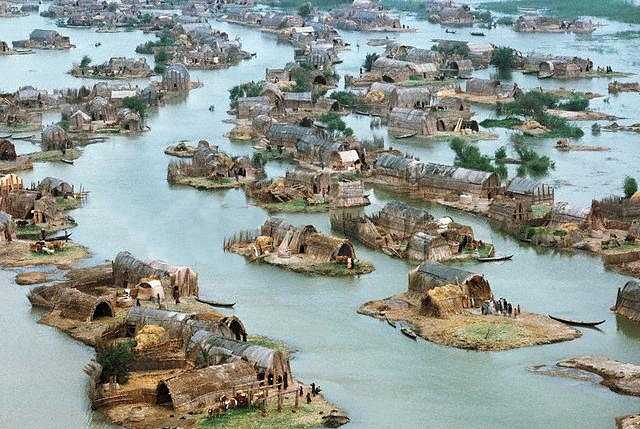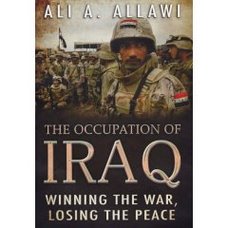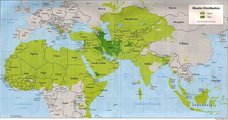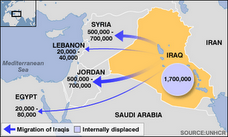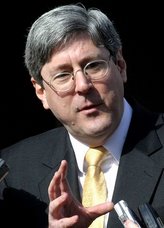 The following is a translation of (an)...email making the rounds among residents of Baghdad and on Iraqi Web forums. The sarcastic email, which was written in Iraqi slang, attempts to classify the districts of Baghdad based on their level of danger. According to the author, the safest neighborhoods are the ones where the odds of staying alive are 50%:
The following is a translation of (an)...email making the rounds among residents of Baghdad and on Iraqi Web forums. The sarcastic email, which was written in Iraqi slang, attempts to classify the districts of Baghdad based on their level of danger. According to the author, the safest neighborhoods are the ones where the odds of staying alive are 50%:The situation in different areas of Baghdad in regard to takfiri gangs of the new age: Al-Qaeda, the Mahdi Army, and their spiritual leaders – the forces of liberation falls into four different categories: safe, relatively safe, dangerous, and relatively dangerous. They are classified as follows:
A safe area: where the probability of you staying alive is 50%. -
A relatively safe: where the probability of you staying alive is 40%.-
A relatively dangerous area: where the probability of you staying alive is 30%.-
A dangerous area: where the probability of you staying alive is 20 to 10%.
Here we go:- The Bayya’ garage, the periphery of Bayya’: No one can ever reach them because the Mahdi Army is randomly abducting people and killing them for what they say is in retaliation for the husseiniya bombing a week ago. -
Shu’la: No one can reach it. - Thawra (Sadr City): No one can reach it.- Sha’ab: No one can reach it.- Amil: No one can reach it. - Jami’a and Khadhraa’: No one can reach them because Al-Qaeda fled Amiriya and Yarmouk and took refuge there. - Mishahda north of Baghdad: No one can reach it because of the presence of gangs that collectively burn people alive. -
Jadiriya is relatively safe. - Karrada is relatively safe. - Mansour is relatively safe. - Harthiya is safe (because of the presence of Kurdish militias). - Yarmouk is relatively safe. - Amiriya is dangerous. - Adhamiya is relatively dangerous (in some parts of it) but there are constant clashes.- Kadhimiya is safe. - Grai’at is relatively dangerous. - Utaifiya is safe. - Haifa Street is relatively dangerous. - The highway that connects Amiriya with the Baghdad gate is relatively dangerous. - Ghazaliya is relatively dangerous because of clashes.- Iskan is safe. - Alawi is relatively dangerous. - The Suq Al-Arabi area is relatively safe. -
Dora is not under the authority of the Republic of Iraq. It is currently an Islamic emirate complete with its own Islamic departments and ministers. Islamic CDs have been distributed to residents to explain the laws of the emirate. -
Saidiya is dangerous.- Camp is relatively safe. - Baladiyyat is safe. - Jisr Diyala is dangerous. - Arasat is safe.- Masbah is safe. - Baghdad Al-Jedida is relatively safe. - Jezirat Baghdad is dangerous. - Abu Ghraib is relatively dangerous. - Mashtal is relatively safe. - Qadisiya is safe. - Hurriya is dangerous. - Dola’i is dangerous. - Adil is dangerous. - Zayouna is safe. - Washash is relatively dangerous. - Bab Al-Sharji is relatively dangerous. - Sa’doun Street is relatively dangerous. - Waziriya is relatively safe. - The Mohammed Al-Qassim highway is relatively safe. - Bab Al-Mu’adham is dangerous. - Fadhl is dangerous. - The Baghdad International Airport highway is relatively safe. - Hutteen or Qudhat is relatively safe.- Ma’moun is relatively safe. - The Dora intersection is dangerous. - Abu Nuwas Street is safe. -
The Baghdad-Ba’quba road is bloody dangerous. - The Green Zone is safe, and sometimes it is dangerous.
I apologize if I left out any areas of our beloved Baghdad but I’m writing and racing with electricity at the same time.
As to Iraqi governorates:- The north of Iraq is safe, except the Ninewa governorate, which is dangerous. - The northern center governorates are relatively dangerous. - The southern center governorates are relatively dangerous. - The governorates of the south are safe, except for Diwaniya and Basrah, which are relatively dangerous. - The west is relatively safe, except for the western highway , which is dangerous sometimes. - The governorates of the east are all dangerous.

















